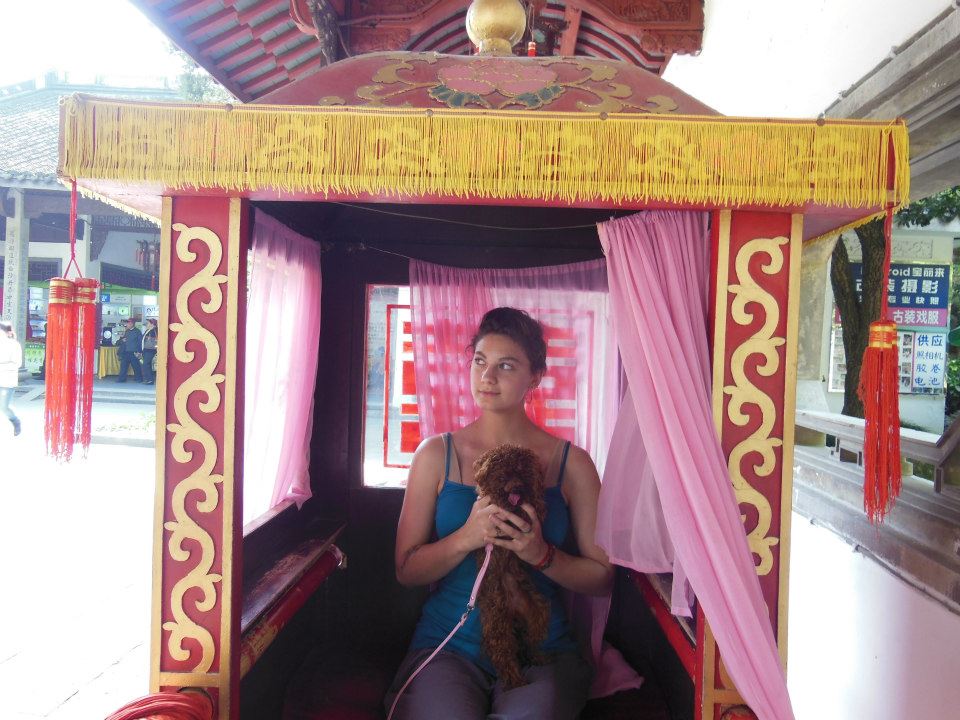Love, Marriage, and Homosexuality in China


This has been a big shift for me. I feel alienated from straight culture, but I also feel alienated from lesbian culture, gay male culture, and sometimes even queer culture. Some queers in the US seem to have a queer-ness appearance standard: you must have an alternative lifestyle haircut (30% buzz cut) mixed gender clothing, and LOTS and lots of tattoos. I have one tattoo, but I still get weird vibes from other queers sometimes. This is not a good feeling.
Love, Marriage, and Homosexuality in China.
My experiences in China prompted me to think about these things. As a foreigner/Westerner in China, people either swarm or avoid you. I took a long-distance bus to Lin’an on which every single person walked past me, scowled, and sat as far as they could from me. Finally, because there were no more seats, an older man sat next to me and scooted to the very far edge of the seat. Then he crossed his legs so he was even farther from me.
Yet other Chinese people were so happy to become friends with me! They ran up to me and took pictures with me, asked me where I was from, giggled when I spoke (terrible) Chinese to them. These two reactions were polar opposites, and sometimes it was incredibly hard to deal with.
So when I returned to the US last week, I was ready to feel like I belonged again. I was ready for everything to be in English and blend in with the crowd. I started thinking about how people of color experience life in the States. Obviously as a white person, I won’t ever know what that experience is really like, but the discomfort I felt on the long-distance bus in China was nothing compared to what people of color go through every day in the US.
The stares, the avoidance, the general feeling that people don’t see you as an equal human… I felt that in China, but I know that people of color feel it every day in my (racist) culture.
As an extension of these thoughts, I wanted to re-consider how I view same-sex marriage.
As an extension of these thoughts, I wanted to re-consider how I view same-sex marriage. Often advocates of same-sex marriage will say things like, “We’re not re-defining marriage or family! Marriage and family are about love.” And those who are against same-sex marriage will often argue the opposite. Well, here’s the awkward reality:
Same-sex marriage does re-define marriage.
“But Natalie!” you object, “How can you say such a thing!” Well, I never thought I would. And I obviously believe that any two people, regardless of their gender, should be able to marry. However, my travels have shown me that for most people in this world, marriage and family are not, at their core, about love. Traditionally, marriage is an economic contract binding two families together. In rural areas, marriage and family are meant to ensure the survival of a farm and continue the existence of the village. I’m not saying that love is never involved, of course. Many people who marry in rural/traditional cultures love each other deeply. I’m just pointing out that the idea of marriage as essentially based on love is actually quite a Western, modern concept.
Same-sex marriage does re-define marriage.
For example, one of my close Chinese friends was struggling with how to move forward in her relationship. She wasn’t satisfied with the relationship, but in Chinese standards, her boyfriend was the perfect future husband: stable, smart, and employed. She wasn’t sure what to do. Social standards told her to stay with her boyfriend even though she wasn’t fully happy. As she told me, her parents loved this guy. I’m not sure what she’ll decide to do.
In China, women are under enormous pressure. Tradition dictates they be quiet, lovely, and sweet. The modern economy demands aggressive individualism, assertiveness, and confidence. The Chinese “ideal man” is tall, rich, and handsome. The “ideal woman” is pale/white-skinned, rich, and beautiful. I heard this from my Mandarin language teacher, and my Chinese friends confirmed it. And the ideal marriage? Well, according to my Mandarin language textbook, the woman stays home alone while the man works constantly to buy the woman beautiful things. That’s a direct translation of what our Mandarin teacher told us.
I’m sure there are other queer ladies reading Pink Pangea, and I would love to hear about your experiences being queer abroad. In China, lesbian identity is mostly divided into T (tomboy, the equivalent of butch) and Po (meaning ‘wifey’, the equivalent of femme). Chinese people are generally very uncomfortable talking about sex in general, so many GLBT people in China live closeted or very quietly queer lives. When I asked my Chinese professor if he thought same-sex marriage would ever be legal in China, he said yes–in 50 years!
Homosexuality is not illegal in China, but it remains largely invisible.
Being gay in China means being unable to provide a grandchild for your parents (adoption is also pretty uncommon and unaccepted) and it can also stunt your career. Homosexuality is not illegal in China, but it remains largely invisible. Chinese parents often find marriage partners for their children by posting ads in parks and negotiating with other parents. Family obligations are a huge presence in China, and there doesn’t seem to be much room for queerness.
So when same-sex marriage advocates in the US say that queer marriage doesn’t re-define marriage, I just don’t believe them! Marriage means so many different things in so many different cultures. In the US, most marriages start as love-based. And then half of them end. So maybe traditional, economy-based marriage really is more stable? All I know is that I’m back in a country where I blend in. I expect to marry someone because I love them.
And I have no idea what gender that person will be. As for my Chinese friend, she might marry for economic reasons, and she might not. It’s a sign of how much Chinese culture is changing that she has the choice.








